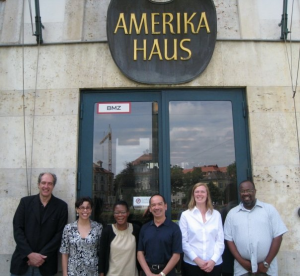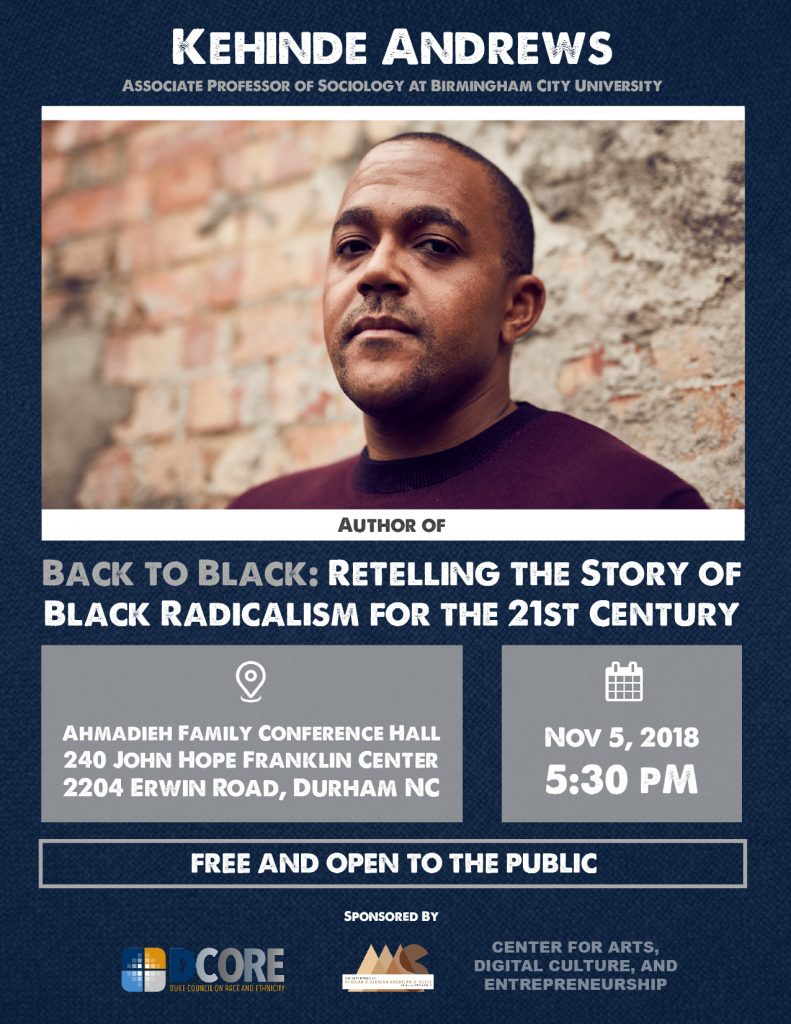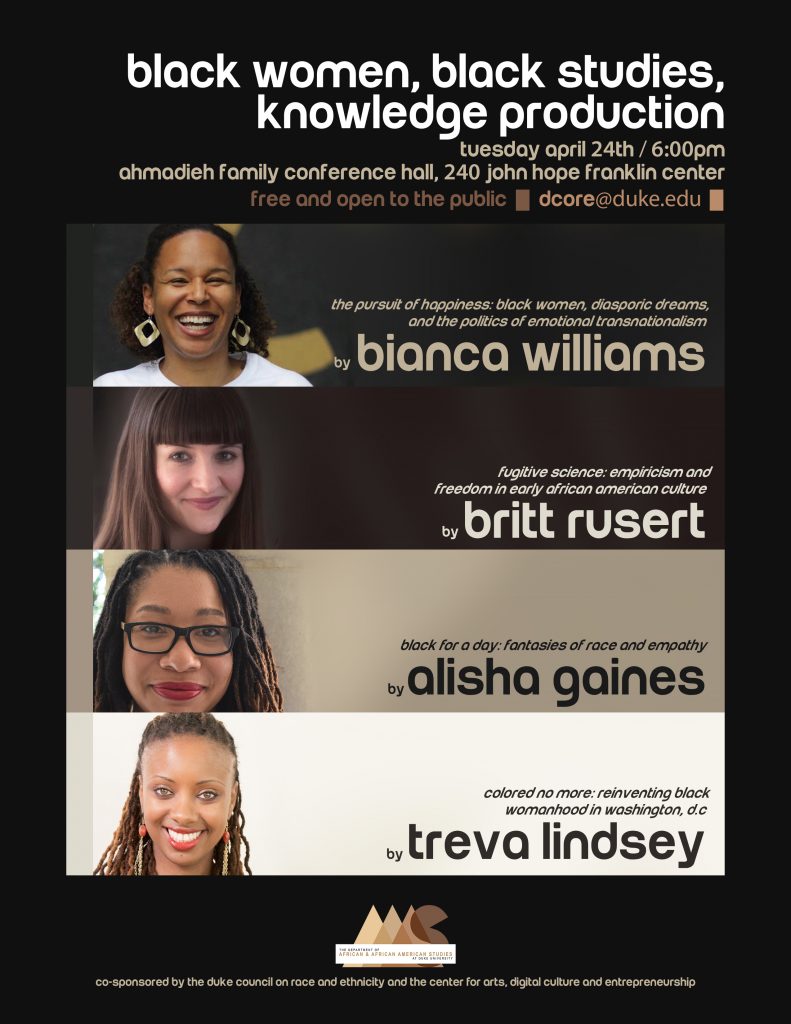Twelve-year-old Fellowship Program Welcomes German Scholars to Duke
Since 2007, German Ph.D. candidates have been coming to Duke through a partnership with the Bavarian American Academy in Munich
By Camille Jackson
German scholar Clara-Sophie Höhn’s nearly eight weeks on Duke’s campus last year helped advance her Ph.D. project to the next level, offering her the opportunity to engage with experts, use the university’s vast library, and benefit from its particular location in the American South.
“The most important aspect for me was that I was able to meet the people I was studying personally and get an impression of who they are and what motivated them to take part in one of the major social movements in the U.S.,” said Höhn whose thesis topic was on antiracism and the role of Southern white women in the civil rights movement.
“I am focusing on intersectionality as established by Kimberlé W. Crenshaw,” Höhn writes in her project summary. “It examines how social categories, in my case race, whiteness, gender, class, culture, and religion, overlap as well as intersect and therefore influence systems of oppression, discrimination, domination and/or privilege.”
Höhn is one of the most recent fellows to be selected for the Bavarian American Academy/Duke University Post-Graduate Research Fellowship, a 12-year partnership between the Duke Center for Race, Ethnicity and Gender in the Social Sciences (REGSS) and the America House Munich – Bavarian Center for Transatlantic Relations.
The fellowship provides students pursuing a Ph.D. in fields such as law, history, and political science, a generous stipend, housing, travel assistance and the opportunity to spend up to 8 weeks on Duke’s campus.
This fall, Duke will welcome its 12th fellow, Axelle Germanaz, a Ph.D. candidate at FAU Erlangen-Nürnberg in American studies.
“For me, the program is very important and impressive. All of the fellows report back on the incredible, helpful and enriching research environment, the ample resources, and the huge benefit of personal communication and intercultural exchange,” said Margaretha Schweiger-Wilhelm, the managing director of the Bavarian American Academy.
The program, which began in the 2007-08 academic year, was founded by the former directors of the Bavarian American Academy (BAA). Professor Kerry Haynie, REGSS director, oversees the program on Duke’s end.
The relationship between Duke and BAA began during a 4-day summer institute, “Ethnicity and Society in America,” held in 2008 at the America House Munich – Bavarian Center for Transatlantic Relations in Munich, Haynie was one of the U.S. faculty members who led discussions on the historical and intellectual dimensions of race in the arts, humanities and social sciences.
At the time, the Executive Director of the Bavarian Center for Transatlantic Relations, Meike Zwingenberger, was BAA’s managing director.
“Professor Haynie has been an outstanding source of information and help for the fellows, together with the local staff. All participants have reported that they received an enormous support at the center,” Zwingenberger said. “The Center (REGSS) has been an excellent partner for younger researchers in Germany working on urban studies, race relations, ethnic entrepreneurship, public policies, presidential election’s voting behavior and other themes connected to social science research.”
“The Fellowship program has been a successful intellectual partnership between the Bavarian American Academy, the Duke Alumni German-American Club, and REGSS,” said Haynie, who hosts the fellows in the physical office space of the Duke Council on Race and Ethnicity.
“The university is an ideal location for scholars working on topics related to race, ethnicity, intersectionality, race relations, and politics because of its excellent faculty, library, and archival resources. We have been able to provide the fellows with a base from which to do in-depth research and fieldwork, and connect with faculty and graduate students who have expertise in their research areas,” Haynie said.
“The relationship has been mutually beneficial. For example, the fellows introduce us to new perspectives and scholarship on topics related to the work of the Center. I’m especially pleased that this partnership provides Duke alumni in Germany with the means to remain connected to the university.”
Zwingenberger said that besides being a prestigious U.S. partner, Duke’s location in the Research Triangle, in North Carolina, and in the southern U.S. made the partnership especially attractive. She added that Duke’s Law School, Fuqua School of Business, Sanford School of Public Policy, as well as REGSS, provided “an excellent academic environment.”
Founded as a network of Bavarian scholars working in the social sciences and other fields to foster academic relationships with the U.S., the BAA sponsors individuals to pursue academic scholarship in the U.S. via fellowships for doctoral candidates. In addition to its partnership with Duke, BAA also sponsors fellowships at Harvard and Yale.
A German Duke alum based in Munich, Markus Nauheim, LLM ‘96, helped secure initial funding for the program to further support the academic exchange between Germany and the U.S.
“Duke is like the ‘Disney World’ of education,” Nauheim said. “I would love for more students to see and experience it. Studying in this type of stimulating environment makes you more curious, makes you really enjoy education, and you can learn about yourself too.
“We are really happy to be able to sponsor students and to encourage them to come to Duke,” Nauheim said. As the chair of Duke Germany, Nauheim helped make it possible for alumni to donate to the program under tax-exempt status. It has been the perfect vehicle for German alumni to show their school spirit.
“German Duke alumni feel very attached to the school. And the more talented and gifted students we can attract, the better. It’s important to be in this sort of company. The Duke brand is not yet as well-known as Yale or Harvard, so the program does a lot for the university’s reputation abroad. It is even more important in the current political environment to further the Transatlantic academic and cultural exchange.”
German universities do not have the same resources top, private American universities have, Nauheim explained, and students are in large classes with few opportunities to form relationships with professors.
At Duke, fellows are able to make use of the university’s cutting-edge resources and special collections of rare books and manuscripts, as well as the vibrant guest speakers and conferences on civil rights-themed issues.
“The academic profile of the Center has been especially attractive for Bavarian scholars working in the social sciences on comparative projects in political science, public policy, urban studies or on race relations in Germany and the U.S. It has provided a starting point for contact with renowned scholars from other U.S. universities.” Zwingenberger added.
Those connections helped Höhn greatly.
“The resource that was helpful the most during my stay at Duke were the personal contacts and conversations I had with various experts on topics that closely relate to my own research focus, such as Kerry Haynie or Wesley Hogan, director of Duke’s Center for Documentary Studies,” Höhn said. “Not only were these interactions highly valuable for discussion and the exchange of ideas, they also helped further develop my research approach. In a practical way, they assisted me with how I should organize my research plan during the time I spent at Duke.”
Kerry Haynie Elected Chair of Academic Council
 From Duke Today:
From Duke Today:
Kerry Haynie, associate professor of political science and African and African-American Studies, was elected the new chair of the Academic Council this past Thursday.
Haynie will succeed current chair Don Taylor, who finishes his two-year term on July 1. Haynie defeated Mark Anthony Neal, James B. Duke Professor of African and African-American Studies, in a closed ballot vote.
Both candidates had long records of university service. Haynie, who also serves as director of Duke’s Center for the Study of Race, Ethnicity, and Gender in the Social Sciences, has served multiple terms on the council and has been a past member of its executive committee. Neal is currently serving on the executive committee.
He has also served on a number of presidential and provostial committees and council committees, such as the President’s Working Group on Community and Dialogue, the Provost’s Committee on Reimagining Doctoral Education, the Undergraduate Education Committee of the Board of Trustees and the Academic Council’s Diversity Task Force.
As council chair, he will take the lead in guiding the faculty’s role in shared governance at the university.
In other council news, Dr. Geeta Swamy, vice dean of the School of Medicine and associate vice provost for scientific integrity, presented revisions to the Misconduct in Research policy in Appendix P in the Faculty Handbook.
The revisions provided clarification of policies, some of which went beyond regulatory requirements while others weren’t aligned with routine practice. It confirmed that the policy was applicable to university researchers other than faculty members.
In addition, the definition of research misconduct is limited to falsification, fabrication and plagiarism, while removing other kinds of misconduct, such as deviations from standard practices.
Swamy noted that some misconducts, such as harassment, are not covered by this policy but both Duke and by national professional associations will continue discussing them. The topic of faculty behavior has been a regular part of the council discussions this year, and it’s likely some new policies will come out of that work.
“These are things we are working toward, but they are separate from this research misconduct policy,” she said.
1969 Allen Building Takeover Alumni Reunite on 50th Anniversary
Nearly two dozen of the protesters met with administrators then told their stories to a sold-out audience
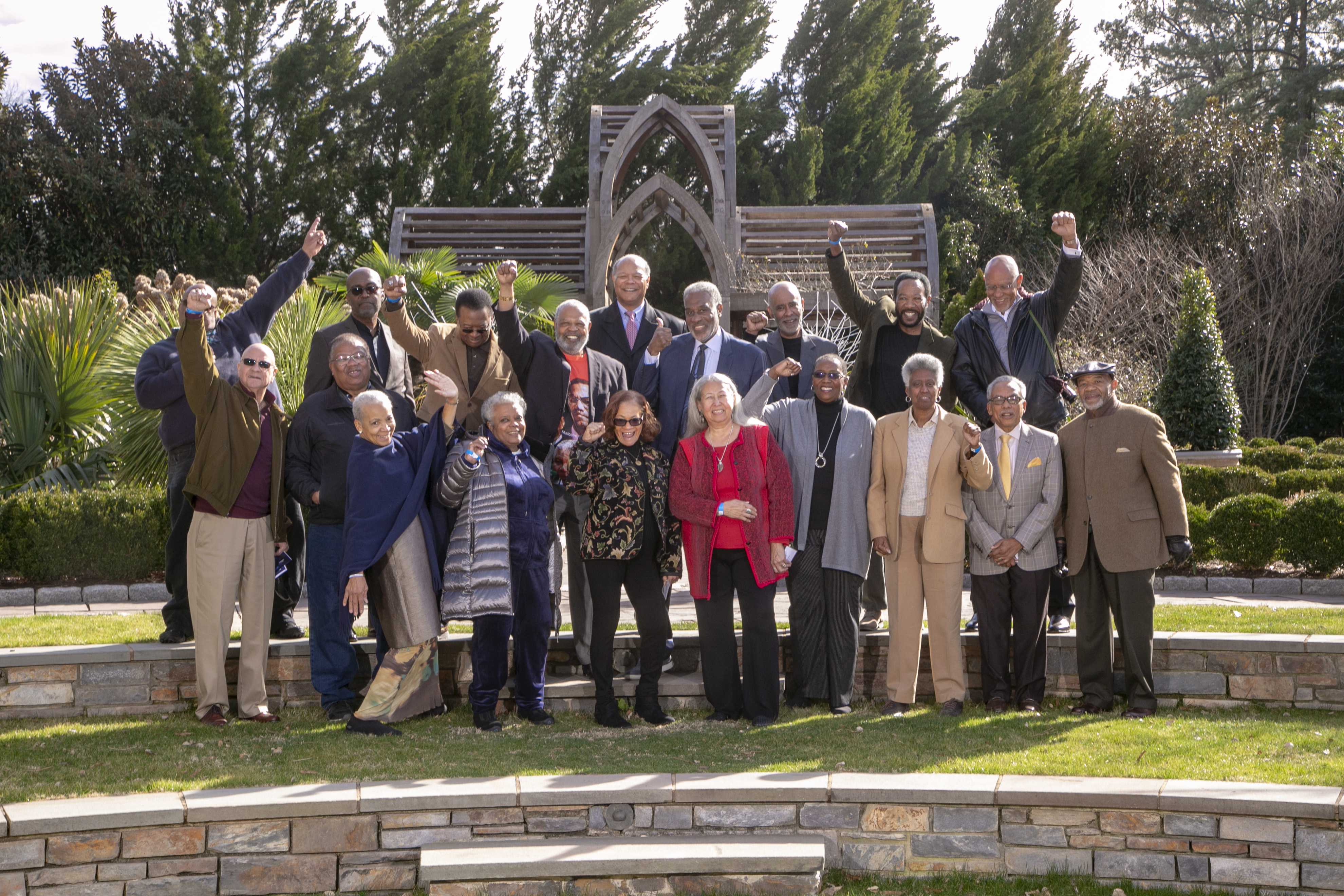
The 1969 Allen Building Takeover has loomed large in Duke’s history. This past weekend, Feb. 9-10, nearly two dozen of the Duke alums who protested returned to campus to check on the status of the demands they issued 50 years ago and to see the impact of their activism.
The sold-out event, “Commemorating the Allen Building Takeover: Fifty Years Later,” was hosted by the Department of African & African American Studies (AAAS) and held in the Ambassador Ballroom at the Washington Duke Inn. Two panel discussions, “The Original Protesters Tell Their Stories,” and “Activism Then and Now: An Intergenerational Discussion,” were followed by a reception at the Nasher Museum of Art. Hundreds attended and watched via livestream.
On Saturday morning, the black Duke alumni who participated in the Allen Building Takeover were invited to a private brunch with President Vincent Price. Price acknowledged their role in challenging Duke to become more inclusive and diverse.
“In the action that you took, you forever shifted our sails towards the prevailing winds of justice and equality,” Price said.

“I don’t quite know how to say thank you enough for what you did 50 years ago,” Valerie Ashby, dean of Trinity College of Arts & Sciences, told the alum in her introductory remarks during Saturday’s main program, adding that her role on campus would not exist had it not been for the takeover.
“So something happens differently for me when I walk in the Allen Building,” she said, describing the portrait of Julian Abele, the black architect who designed Duke’s campus. “Then I go into my office … which is right outside of where you did your work, I am not confused about how I am able to walk into that office each day. I owe you a huge debt of gratitude. Our job is to make you proud. Our job is to continue to help the university move forward so nothing that you did would have been done in vain.”
Ashby joined Mark Anthony Neal, chair of AAAS, and Qsanet Tekie, ’19, president of the Duke Eritrean and Ethiopian Student Transnational Association, to welcome “the Originals” and provide historical context for their activism 50 years ago. On Sunday, the Duke alumni had an informal Sunday service with remarks by Rev. Bill Turner, ’71, and previewed an exhibit on the takeover in Perkins Library.
Many of “the Originals” had attended rural, segregated schools. They had been hand-picked by their communities — as national merit scholars and academically gifted — to attend Duke not long after the university integrated in 1963.
The impetus for the Takeover came when fall semester grades were released.
“I had black people coming up to me who had never come to any meetings or who had never spoken to me, come to me and said, ‘Chuck we have to do something, these grades are not fair.’ They had stories of [the racism] they had experienced in class,” said Chuck Hopkins, ’69, co-founder of the Afro-American Society.
On Feb. 13, 1969, Hopkins and dozens of other black Duke students barricaded themselves inside of the Allen Building, presenting the university administration with a list of demands, an action that has become a model for student activism on campus over the years.
The takeover resulted in the hiring of more black faculty, the creation of a black studies program which would eventually become AAAS, and a black student union that is now the Mary Lou Williams Center for Black Culture.
All agreed it took courage and commitment to go into the building.
“I was concerned we might die, especially if we brought guns,” Michael McBride, ’71, said. At other colleges and universities, students were being shot and killed for protesting.
“One of the things we strategized in our meetings was that we weren’t going to bring arms or touch anyone. Our whole thing was let’s not give the administration a reason to focus on something else,” Hopkins said.
“Once we decided to do that I called Mark Pinsky, ’69, at the (Duke) Chronicle to make sure the national press would cover it. We didn’t want to be an isolated event down here in Durham,” he said. “Howard (Fuller) came later in the day.”
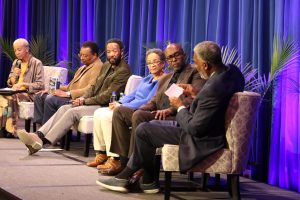
Fuller, who at the time of the takeover was a local community activist in Durham, mentored the Duke students and later became co-founder of Malcolm X Liberation University, where some of them enrolled after leaving Duke that spring.
In the aftermath, the students were put on probation, some were arrested, and some left Duke altogether, never to return.
“We figured the university would not suspend all black students. As part of our trial strategy, we had them sign a document saying they had gone into the building, even when they hadn’t,” Becton, JD ’69, said. “It was not just the students, but the future of Duke that was on trial.”
“It’s easy to talk about now, but it wasn’t easy on that day. We could have been killed. That is not a statement in the abstract,” Fuller said. “When we went into that building in 1969, we were extending the lines of hope and organization. We took our people’s history and suffering into that building.”
VIEW COVERAGE INCLUDING PHOTOS HERE
Commemorating the 50th Anniversary of the Allen Building Takeover
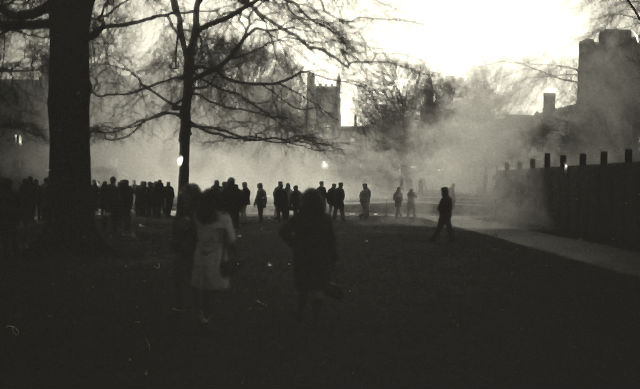 This Saturday, Feb. 9, Duke University will grapple with a portion of its racial history, commemorating the fiftieth anniversary of a pivotal occasion that forced the university to eventually evolve to offer one of the top-ranked black studies programs in the country.
This Saturday, Feb. 9, Duke University will grapple with a portion of its racial history, commemorating the fiftieth anniversary of a pivotal occasion that forced the university to eventually evolve to offer one of the top-ranked black studies programs in the country.
The story of the Feb. 13, 1969, “takeover” of the Allen Building, a surreal moment when tear gas covered the quad, only hastily captured in blurry black and white photos, has been passed down through generations of student activists.
In response to pervasive discrimination, a group of 60-75 black students organized and barricaded themselves inside the university’s main administrative building, issuing a typed list of 12 demands. At the top of the list, they wrote– “we want the establishment of a fully accredited department of Afro-American studies.”
Now, on the anniversary of their activism, the Department of African & African American Studies at Duke for which they paved the way, has invited those black student activists back to campus to acknowledge their sacrifice and contribution to the university.
The group will reunite this weekend for “Commemorating the 1969 Allen Building Takeover: Fifty Years Later,” an event hosted by the department.
The 12:30 p.m. program will be held in the Ambassador Ballroom at the Washington Duke Inn and includes two panel discussions: “The Original Allen Building Takeover Protesters Tell Their Stories,” followed by “Activism Then and Now: An Intergenerational Conversation.”
[NOTE: The event is at capacity. Attendees already registered are encouraged to arrive early as seating is limited. Late attendees will be directed to overflow seating at the Nasher Museum of Art or the Rubenstein Arts Center. At the end of the program, attendees will be shuttled to a reception at the Nasher Museum of Art for where a live DJ playing music from the late ‘60s and early ‘70s. Free parking is available for all of the day’s events. A free shuttle will transport attendees back and forth between the two venues during the afternoon and early evening.]
To see the full schedule and available parking, go to https://aaas.duke.edu/abt50. Those unable to attend can watch a YouTube live stream and follow the discussion on Twitter @dukeaaas or by searching hashtag #DukeABT50.
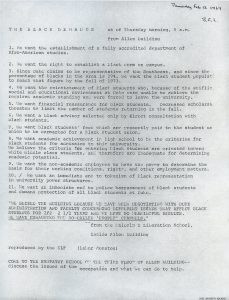
Nearly 30 of the original Allen Building Takeover participants are expected to return to Durham, many of whom have not seen each other for 50 years. They have mixed feelings about their experience at Duke and are pleased to know about the impact of their activism.
“Fifty years later, it brings me great joy to know that the same institution which called in the police and National Guard on us in 1969, would today, welcome us back and acknowledge that our actions contributed positively to the evolution of the university,” said Catherine LeBlanc ’71, a business/education consultant, who was among the fifth class of black students to enter Duke.
LeBlanc will moderate a panel of fellow participants sharing first-hand accounts. A second panel will feature Duke alumni from several generations, including the recent 2016 Takeover, as well as former local/community activist Howard Fuller who mentored the Takeover participants.
“Six years after the first cohort of Black Students entered Duke in 1963, Blacks students and their allies were willing to put their academic careers and professional futures on the line, to push the university into the future,” said Mark Anthony Neal, professor and chair of the Department of African and African American Studies.
“The sacrifice of those students, including the trauma and anger they may have carried with them from participating in The Takeover, has helped create the Duke that we know today – not quite where it needs to be, but a far cry from what it was,” he said.
For more information on the Allen Building Takeover, visit Guide to the Allen Building Takeover Collection, 1969-2002 or listen to recordings of student radio station broadcasts from February 13, 1969.
OTHER ALLEN BUILDING TAKEOVER 50TH ANNIVERSARY EVENTS
The Allen Building Takeover marks the moment that Duke as an institution began to grapple with what it means to be an inclusive community, said Duke University Archivist Valerie Gillispie. “The alumni who participated in the Takeover did so at significant personal risk in order to bring attention to the struggles of African American students,” she said.
Last summer Gillispie organized a team of undergraduate students to curate an exhibit, “Black Students Matter: Taking Over Allen in ’69,” set to open on Feb. 13 in Perkins Library, Chappell Family Gallery. The event, free and open to the public, will begin at 4:30 p.m. Duke undergraduates, Lexi Kadis, Alan Ko, and Zara Porter, under the mentorship of a Duke graduate student, Ellen Song drew from a number of collections held by the University Archives to curate the exhibit.
“It was important to me that the exhibit resonate with today’s student body, and that it draw connections between the issues of 1969 and the concerns faced by today’s students of color,” Gillispie said. “The exhibit is a chance for the entire campus to reflect on the events of February 13, 1969 and the ways it impacted the fifty years that have followed.”
At 6:30 p.m. on the same evening, “Students Demand Change: The Genesis of the Mary Lou Williams Center for Black Culture,” also free and open to the public, will be held at the in the Flowers Building in The Underground room. [Space is limited]
“It will be a reflective conversation,” said Chandra Guinn, MLWC director. “Through dialogue, we will consider how student activism and students’ demands called for and became the catalyst for institutional change.”
Attendees will reflect on student activism throughout the years and the conditions that gave rise to the Allen Building Takeover with a focus on “what work is left to do.”
“It is important to take time to reflect on how far we have come and what is left to do to help make the campus community one where all feel welcome and supported. It is because students demand change that institutions are made better,” Guinn said.
For more information, contact the Mary Lou Williams Center for Black Culture.
AAAS Town Hall 2018: Reparations Now?
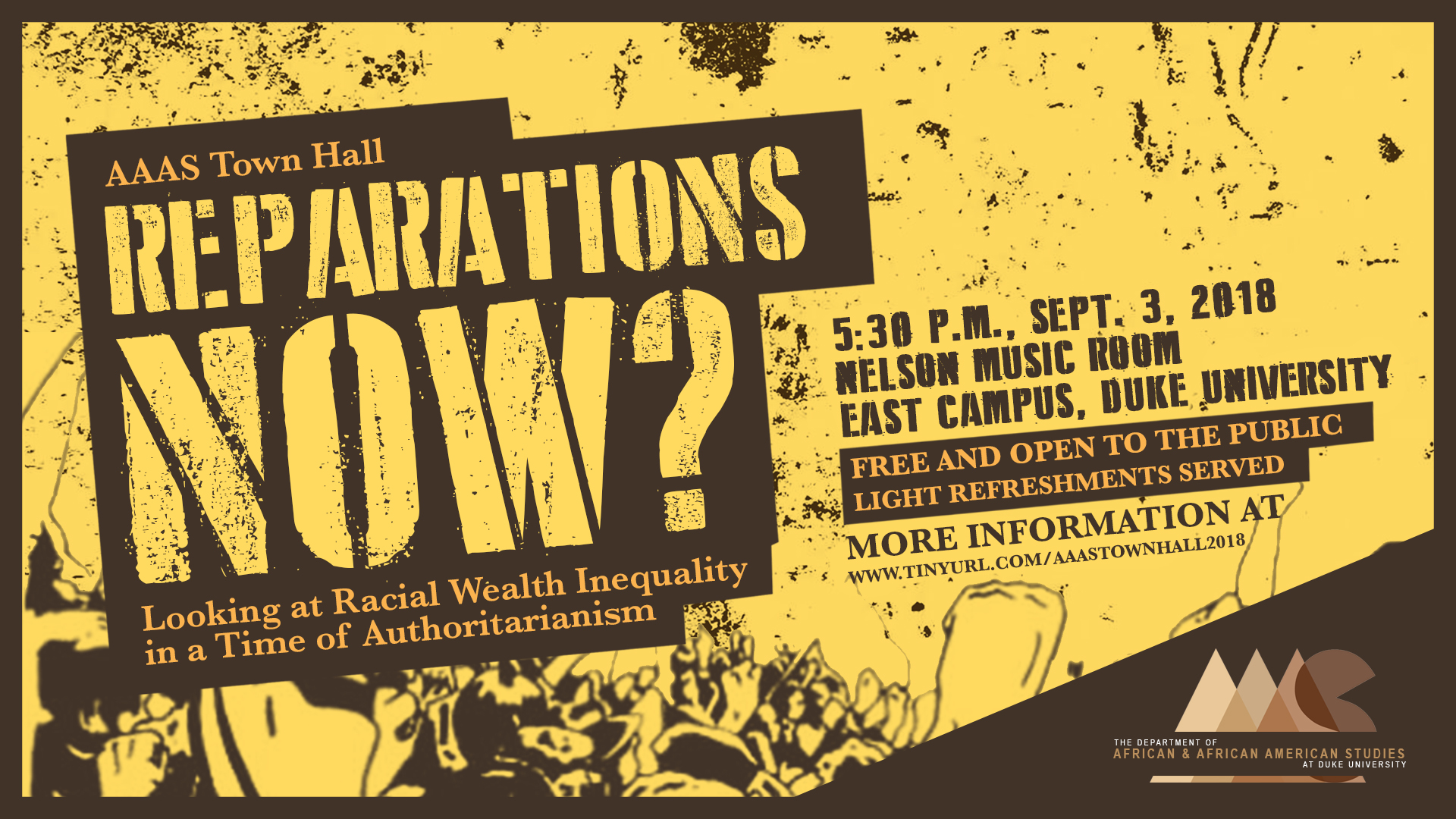 The Department of African and African American Studies (AAAS) at Duke University will kick off the 2018 academic year with a town hall forum on reparations.
The Department of African and African American Studies (AAAS) at Duke University will kick off the 2018 academic year with a town hall forum on reparations.
The event, “Reparations Now? Looking at Racial Wealth Inequality in a Time of Authoritarianism,” will be held at 5:30 p.m. on Monday, Sept. 3rd, in the Nelson Music Room, East Duke 201, on the university’s East Campus. It is free and open to the public. Light refreshments will be served.
Panelists will address the question: What might come of public dialogue around the question of reparations for African Americans in the era of the Trump regime with its continual attacks on the press and dissemination of knowledge, and while there is a Republican-controlled Congress?
“We are living through a moment when two converging elements of our social, political, and economic existence are coming together: the existence of heavily racialized wealth inequality and increasing authoritarianism,” says Wahneema Lubiano, a professor of African and African American Studies.
Lubiano is co-organizing the event with William “Sandy” Darity, the Samuel DuBois Cook Professor of Public Policy, and a professor in the Sanford School of Public Policy, Department of Economics as well as the Department of African and African American Studies.
Darity has been a long-time advocate of reparations for black Americans. In a 2016 article in The Atlantic he wrote, “There is no doubt that the political obstacles to congressional approval of black reparations are significant. … If black reparations is the right thing to do—and I know in the depth of my soul that it is—then we should work to make it happen, no matter how long the odds. We should not bow at the altar of presumed political expediency.”
Lubiano says that raising the issue of black reparations offers an opportunity to consider “the complexities of black reparations against the fear that U.S. democracy itself is being roiled by authoritarianism.”
“We’re going to discuss what reparations has meant and could mean, what concepts are embedded in the public discussion of wealth inequality, and what the relation of reparations might be to changing racialized wealth inequality, all while authoritarianism is both gathering force and contested,” she said.
Panelists are:
- William A. Darity, Jr.
Duke Sanford School of Public Policy, Departments of African & African American Studies, and Economics - Laurent Dubois
Duke Department of History - Malik C. Edwards
NCCU School of Law - Amber S. Hendley
Duke Departments of Economics and Political Science - Andrew Lee
Duke Department of Computer Science - Wahneema Lubiano
Duke Department of African & African American Studies - Joseph R. Winters
Duke Departments of Religious Studies and African & African American Studies
Black Studies All Up In Your Classroom: Students Create Online Curriculum
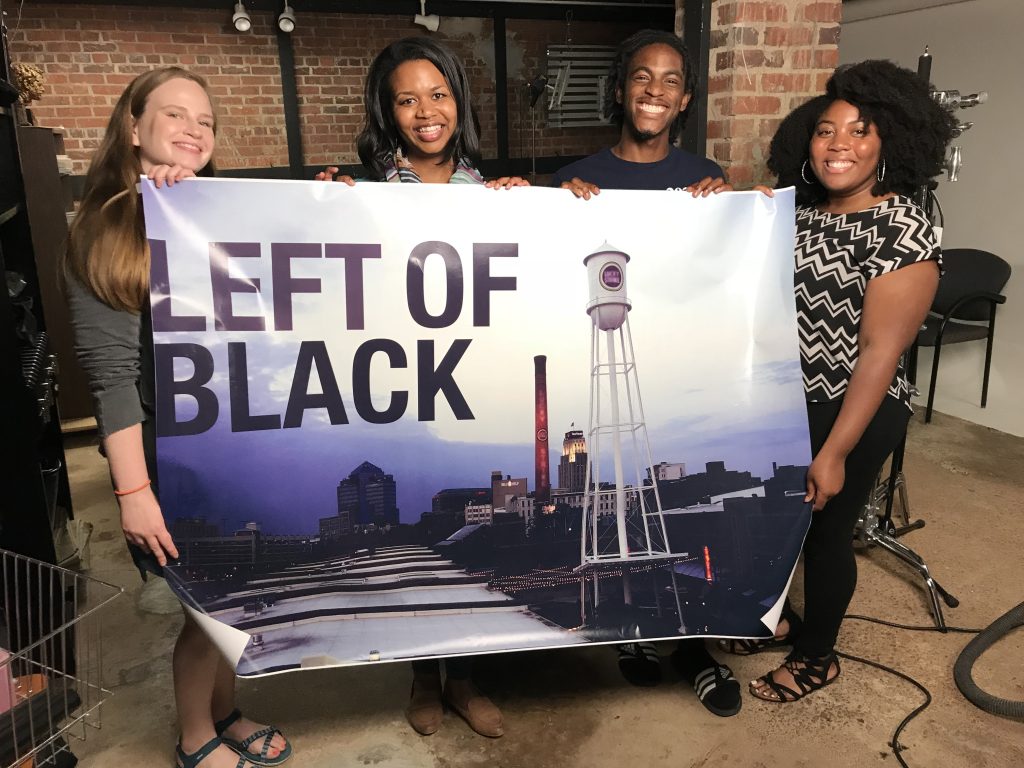
Find the stories. Make lesson plans. Put it online.
That’s what a team of students working for the weekly webcast Left of Black was tasked with this summer, but it wasn’t so simple. The webcast showcasing scholars, artists, musicians, just completed its 8th season. That meant there were nearly 250 videos and guest interviews to sort through, many of which hadn’t been in circulation since they first aired years ago.
With funding from Story+, a 6-week summer research program in the Franklin Humanities Institute (FHI), the students, two graduate and two undergraduate, set out to accomplish the mission. Using their respective skills of creating lesson plans, video editing, website building and some acquired new skills, they found interesting stories in the Left of Black archive and turned them into online teaching modules for middle- and high-school students.
The enrichment modules include a video clip derived from a Left of Black episode, a lesson plan and a “digital student experience,” as well as supplemental reading. The Story+ Left of Black team exceeded their initial goal of creating two modules — the team was able to produce four — and made their final presentation at a FHI research symposium on Wednesday, June 27 at Smith Warehouse.
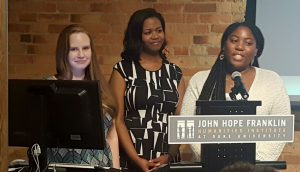
The themes covered in the modules are: service and citizenship, the cultural significance of Black barbershops, the role of music in the Black Power Movement, and Black armed resistance. Each module includes discussion questions, timelines, vocabulary and further reading and is in alignment with the state’s common core standards. The digital experiences and lesson plans can be accessed online here: https://sites.duke.edu/leftofblackenrichment.
Duke undergraduates Ce’Ondra Ellison and Malcolm Brown had both taken classes in Duke’s Department of African & African American Studies and were passionate about what themes and characters they might find.
“This information is so lacking,” said Ellison, an African-American Studies major from High Point, N.C. “I am hoping this work will have long-lasting impact on education.”
Brown was enthusiastic about the project, and quickly grasped the technical aspects of the project like animating a grandmother for a video clip about Black armed resistance.
Graduate students Allison Raven and Nicole Higgins each had prior experience teaching in classrooms and creating lesson plans.
The Story+ experience “allowed me to stay connected to work I had been doing before with high school teachers, which is easy to lose in academia,” Higgins said.
Raven agreed.
“I think we have been extraordinarily lucky with our team. None of us knew each other before beginning the project. For something that relies so heavily on teamwork, this could have gone really badly, but we all balance each other really well and work well together. And I loved the collaborative aspect,” Raven said.
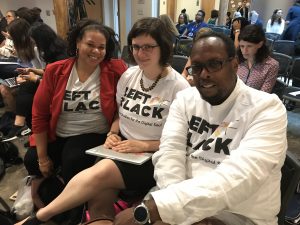
As a team, Raven said they gained a deeper understanding of how to tell stories in the digital age and which tools to use, including social media. The team won FHI’s Story+ Instagram challenge.
FHI’s Chris Chia, Amanda Starling Gould, and Eric Barstow, provided infrastructure and guidance as the Left of Black team delved into the archive and selected a WordPress template on which to build the website.
Left of Black host Mark Anthony Neal, who is also the chair of African & African American Studies at Duke, helped the students select four episodes in which to focus their efforts:
- Quincy T. Mills, a history professor at Vassar College and author of “Cutting Along the Color Line: Black Barbers and Barber Shops in America”;
- Chad L. Williams, chair of the African American Studies Department at Brandeis who wrote, “Torchbearers of Democracy: African American Soldiers in the WWI Era”;
- Ricky Vincent, author of “Party Music: The Inside Story of the Black Panthers’ Band and How Black Power Transformed Soul Music”; and
- Akinyele Umoja, an associate professor of African-American Studies at Georgia State who wrote, “We Will Shoot Back: Armed Resistance in the Mississippi Freedom Movement.”
The students took excerpts of these videos and used graphics and animations to produce enrichment videos like this one:
First started in 2010, Left of Black is now entering its 9th season. Neal has interviewed a number of notable scholars over the years including Carrie Mae Weems, Cornel West, Michael Eric Dyson, Marc Lamont Hill and Melissa Harris Perry. There are plans to continue building the Left of Black curriculum and digital platform.
“It has reinvigorated the project for me,” Neal said. “It’s something we had envisioned from earliest days of Left of Black and we were thrilled to have a team of students to help us realize that vision. It serves as model for what integrated learning could look like, not just at Duke but in the production of scholarship for a broader audience.”

Co-Creating Knowledge: An Intellectual Reunion of Duke Alumnae

More than 50 people gathered in the Ahmadieh Family Conference Room on Tuesday evening, April 24, for a special meeting of Duke’s Introduction to African & African American Studies class, taught this spring by department chair Mark Anthony Neal.
Professors Britt Rusert, Treva Lindsey, Alisha Gaines and Bianca Williams are Duke Ph.D.’s who each had a book on blackness published in the past year. Neal made those books assigned reading for the spring class and invited the alumnae back to campus to speak with students and to revisit their formative years where the seeds for their intellectual pursuits were planted.
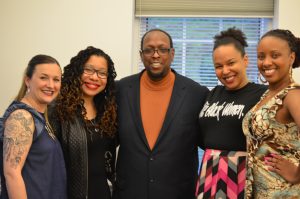
The symposium, “Black Women, Black Studies, Knowledge Production,” was entirely curated by graduate and undergraduate students in a demonstration of vertical learning. English Ph.D. student and teaching assistant Israel Durham designed the program for the 2.5 hour symposium, allowing each student an opportunity to converse with the authors.
The students, divided into small groups, passed a microphone and peppered each alumna with thoughtful questions related to their research as well as their scholarly approach and process. View Photos
Wearing a “#CiteBlackWomen” t-shirt, Williams told students that what they were experiencing was special and a testament to the “brilliant teaching” at Duke.
“You get to co-create. You also know things. You have useful questions. You know enough to engage scholars,” she told students.
“I just want you to know this isn’t normal. This doesn’t usually happen,” Williams said, noting the generosity of professors like Neal and Wahneema Lubiano, an associate professor and mentor to the women, who also attended and joined the women for the last panel of the evening.
“Wahneema would write down every foolish thing we said,” Williams remembered of her time as a student. “It might not have been what I said, but [she knew] what I meant. She would take our nugget, add to it, and give it back… That is generosity and it’s not the norm. After being in other environments, I want you to know this is a gift that we all received.”
Lindsey agreed, reminiscing about the familial kinship she felt in her cohort and with the faculty.
“The faculty believed in us as knowledge producers,” Lindsey said. “I wouldn’t have made it without Wahneema and MAN because of the confidence they instilled in us to be voices, but also to be on the front lines when things went down here,” Lindsey said. “That is the type of faculty member I want to be.”
Gaines, who is interested in black popular culture and reality television, said Black women gave her a way to imagine herself as a scholar and a thinker, especially as an undergraduate student at Spelman.
“I’m a good teacher because I have had good models for it,” Gaines said.
Rusert remembers the freedom to be intellectually adventurous while she was a student at Duke.
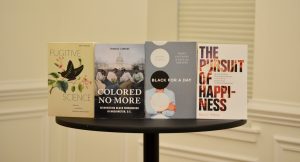 “I was 22 years old and remember being in that class (The Post-Black Aesthetic). MAN took our ideas seriously. I remember being like ‘wow!’ This professor really wants to hear what I think,” she said, adding that the interdisciplinarity of the department prepared her for study in her field in unexpected ways.
“I was 22 years old and remember being in that class (The Post-Black Aesthetic). MAN took our ideas seriously. I remember being like ‘wow!’ This professor really wants to hear what I think,” she said, adding that the interdisciplinarity of the department prepared her for study in her field in unexpected ways.
Also, she said that she’s been able to confront Southern bias as a professor now teaching in New England.
“I am really grateful to have had time training in the South because I can correct some misunderstandings,” Rusert said.
Rusert is an assistant professor in the W. E. B. Du Bois Department of Afro-American Studies at University of Massachusetts, Amherst, is the author of Fugitive Science: Empiricism and Freedom in Early African American Culture and co-editor of W. E. B. Du Bois’s Data Portraits: Visualizing Black America, a collection of data visualizations Du Bois contributed to the 1900 Paris Exposition and forthcoming from Princeton Architectural Press in fall 2018. She earned an English Ph.D. and certificate in feminist studies from Duke in 2009. She is beginning a new monograph about William J. Wilson’s African-American Picture Gallery (1859), a text that imagines the first museum of black art in the United States.
Lindsey is an associate professor and the Director of Undergraduate Studies of Women’s, Gender, and Sexuality Studies at The Ohio State University. She authored, Colored No More: Reinventing Black Womanhood in Washington D.C., a Choice 2017 “Outstanding Academic Title.” Recently dubbed #ProfessorBae by Bossip magazine, Lindsey’s research and teaching interests include African American women’s history, black popular and expressive culture, black feminism(s), hip hop studies, critical race and gender theory, and sexual politics. She earned a master’s degree and a Ph.D. in history at Duke.
A lifelong Michael Jackson fan, Alisha Gaines received a Ph.D. in English from Duke and also received the graduate certificate in African and African American Studies. She is assistant professor of English at Florida State University where she won a university-wide Undergraduate Teaching Award in 2017. Her first book, Black for a Day: Fantasies of Race and Empathy, was published in Spring 2017. Inspired by the short-lived F/X reality tv show “Black.White,” the book constructs a genealogy of white liberals who temporarily “become” black under the alibi of racial empathy. As such, Gaines has a love/hate relationship with Rachel Dolezal.
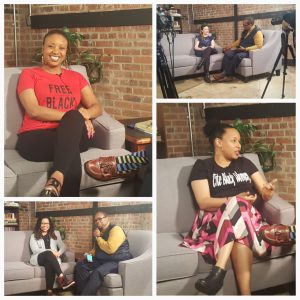
An associate professor of anthropology at The Graduate Center, City University of New York, Bianca Williams is also Black Lives Matter organizer, co-founding the Denver chapter. She earned a bachelor’s degree and a Ph.D. in cultural anthropology at Duke, and a graduate certificate in African and African American Studies. Her book, The Pursuit of Happiness: Black Women, Diasporic Dreams, and the Politics of Emotional Transnationalism, how African-American women use international travel and the Internet as tools for pursuing happiness and leisure; creating diasporic relationships; and critiquing American racism and sexism. Central to her research is the question, how do Black women develop strategies for enduring and resisting the effects of racism and sexism, while attempting to maintain emotional wellness?
Neal, host of weekly webcast Left of Black, interviewed the four women about their work earlier that day in the John Hope Franklin Center studio for upcoming episodes of the show. An appearance on Left of Black has increasingly become a rite of passage for a network of young black studies scholars.
“A cohort experience becomes part of our building of knowledge so the production part is apparent. We’re making it as craft, it’s not an arcane thing,” Lubiano, an associate professor of literature and a long-time Duke faculty member, told students at the symposium. “We are actively participating in creating knowledge, thinking about the students and making them central to the work early on.
“I’ve seen students go from undergrad to full professorships,” she said. “Making knowledge is not a finished ‘house,’ we’re always building. It’s important to make your fracturing speak to someone else’s fracturing. We take seriously the process of remaking knowledge.”
Mellon Foundation to Fund Expansion of Duke Model For Mentoring Underrepresented Early Career Faculty
 The Andrew W. Mellon Foundation is funding the expansion of Duke’s Summer Institute on Tenure and Professional Advancement (SITPA) program. SITPA is an intensive research mentoring and professional socialization program for early career faculty who are from underrepresented groups or who otherwise deepen diversity at their institutions.
The Andrew W. Mellon Foundation is funding the expansion of Duke’s Summer Institute on Tenure and Professional Advancement (SITPA) program. SITPA is an intensive research mentoring and professional socialization program for early career faculty who are from underrepresented groups or who otherwise deepen diversity at their institutions.
One of SITPA’s objectives is to address a nationwide problem in higher education—the underrepresentation of various racial and ethnic minority groups on the faculties of U.S. colleges and universities.
The SITPA approach concentrates support and mentoring of junior faculty early in their career, with the goal of enabling a successful transition to tenured associate professor rank. The Duke program will receive $698,000 over three and a half years, from July 1, 2018, to December 31, 2021.
“Duke is committed to the value and need for diversity in the professoriate,” noted Valerie Ashby, dean of Duke’s Trinity College of Arts & Sciences. “I have seen this program in action, and this approach will enable us to build a stronger, more inclusive university community which is essential to our future.”
The U.S. has succeeded in significantly increasing the number of minorities receiving doctorates in a broad range of fields in recent decades. However, faculty diversity has changed only marginally and is not keeping pace with the nation’s shifting population demographic.
“We need underrepresented minority faculty members and others who recognize the importance of having diverse faculties to become long-term stakeholders who help shape the mission, curriculum, student body and faculty at our institutions,” said SITPA creator and Director Kerry Haynie, an associate professor of political science and African & African American studies. “We’ve designed a program that provides promising scholars with the knowledge, strategies and support they need to earn tenure.”
Haynie plans to present the SITPA model at national conferences over the next three years and to publish on the benefits of this faculty development approach. In addition, he hopes to enlist two to three colleges to pilot the program on their own campuses.
Duke launched the SITPA program in 2014 with the support of the Mellon Foundation. To develop the program focus and format, Haynie utilized existing research, sought input from senior faculty from a wide range of fields, and made use of lessons learned from his experiences with other mentoring initiatives. The need for universities to invest more in the success of junior faculty was a consistent finding from these inquiries.
“We’ve designed a program that provides promising scholars with the knowledge, strategies and support they need to earn tenure.”
– Kerry Haynie
Research reveals that graduate programs do not routinely include professional socialization as part of their formal training. In addition, most university faculty mentoring programs fail to address some of the distinctive concerns and needs of faculty from underrepresented minority groups.
For example, a significant proportion of humanities and social sciences faculty of color specialize in research related to race, ethnicity, difference or intersectionality. However, few senior faculty will have matching expertise in any given department or university. As these topics are positioned at the margins of most disciplines, it is more challenging for such scholars to publish in leading disciplinary journals. As a result, it is more difficult for underrepresented minority faculty to become part of professional networks with influential scholars in their fields.
To date, three cohorts of 16 fellows are engaged in the sustained, two-year sequence of SITPA programming. Each fellow has ongoing guidance and feedback from a senior faculty mentor in their discipline at an institution with similar expectations for tenure. Thirty-eight of the 48 fellows come from doctoral universities, five from master’s colleges and universities, and five from baccalaureate colleges, including two from historically black colleges and universities.
At the start of the fellowship, selected SITPA faculty members attend a three-day workshop to learn about the formal tenure process. They also learn how to develop a research agenda and teaching portfolio that meets the standards and requirements for tenure at their particular college or university. Fellows engage in conversations about constructing a teaching portfolio, navigating university service demands, making effective use of professional networks, and managing work-life demands.
Preliminary evaluation results suggest SITPA fellows are outperforming a selected comparison group with regards to research productivity, said Haynie.
